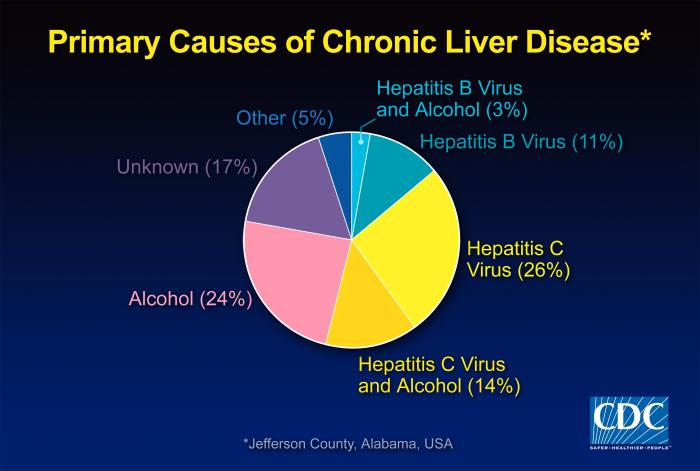What Is Hepatitis?
Hepatitis is liver inflammation. Toxins, certain drugs, some diseases, heavy alcohol use, and bacterial and viral infections can all cause hepatitis. Sometimes, hepatitis can even spread through sexual contact. Viral hepatitis is an infectious disease. There are several types of hepatitis common in the United States. Hepatitis A, B, and C are the most common in this country.[1]
How Many Types of Hepatitis Are There?
Five main types: A, B, C, D, and E.[2]
What Is Hepatitis A (HAV)?
Hepatitis A is a contagious liver disease. An infection due to the Hep A virus causes this disease. It can range in severity. Some people only have HAV for a few weeks. Others aren’t so lucky. For some, Hep A can be severe and last for months.[3]
How Is Hep A Spread?
Hep A is usually spread when a person ingests fecal matter. This can happen even if you only ingest microscopic amounts. How does this ingestion happen? Usually from contact with objects, food, or drinks contaminated by the feces of an infected person. Sometimes, a person can catch Hep A through sex.[2][3]
How Can I Prevent Hep A?
The best way to prevent Hep A is by getting vaccinated.

What Is Hepatitis B (HBV)?
Hepatitis B is a contagious liver disease. It can range in severity. Some people only experience a mild illness lasting a few weeks. For others it can develop into a serious, lifelong illness.[4]
What Is the Difference Between Acute and Chronic Hep B?
Hep B can be either acute or chronic. An acute Hep B virus infection is a new, short-term illness. It occurs within the first 6 months after someone is exposed to the Hep B virus. Acute infection can (but not always will) lead to chronic infection. Chronic Hep B is a long-term illness that occurs when the Hep B virus remains in a person’s body. It is a serious disease that can result in long-term health problems, even death.[1][2][4]
How Is Hep B Spread?
Hep B is usually spread through blood, semen, or another bodily fluid from an infected person to an uninfected person. This can happen through a number of ways, including sexual contact and sharing needles, syringes, or other drug-injection equipment. An infected mother can also pass Hep B to her baby at birth.[2][4]
How Can I Prevent Hep B?
Some of the best ways to prevent Hep B are by getting vaccinated, avoiding drug use, and following safer sexual practices. Safer sexual practices include:
- Being in a monogamous relationship with a clean partner
- Using condoms correctly
- Getting regularly tested

Go here for more information on how to have safer sex.
What Is Hepatitis C (HCV)?
Hepatitis C is a contagious liver disease. It results from infection with the Hep C virus. It can range in severity. Some only have it for a few weeks. Some might have it develop into a chronic condition.[1][5]
What Is the Difference Between Acute and Chronic Hep C?
Hep C can be either acute or chronic. An acute Hep C virus infection is the illness that occurs within the first 6 months after someone is exposed to the Hep C virus. For many people, acute infection leads to chronic infection. Chronic Hep C is a serious disease than can result in long-term health problems or even death.[1][5]
How Is Hep C Spread?
Hep C is usually spread when an infected person’s blood enters the body of someone who is not infected. Many people become infected by sharing needles or other equipment to inject drugs.[2][5]
How Can I Prevent Hep C?
There is no vaccine for this type of hepatitis. The best way to prevent it is by avoiding behaviors that can spread the disease, especially injection drug use.

What Are the Symptoms of Hepatitis?
Symptoms can vary based on the individual, as well as the type of hepatitis contracted. Similar symptoms can appear in those who have Hep A, B, and C, such as fever, fatigue, dark urine, and jaundice. Jaundice is the yellowing or even greening of the skin and eyes. Jaundice is not exclusive to hepatitis.[1][2]
Some people may not show symptoms. When no symptoms show, this person is asymptomatic.

When Do Hepatitis Symptoms Appear?
It varies. According to the Centers for Disease Control and Prevention (CDC):
- Hep A symptoms appear most often after 4 weeks,[3]
- Hep B usually after 3 months,[4] and
- Hep C typically anywhere from 2 to 12 weeks.[5]
How Can I Prevent Hepatitis?
There are several ways to help protect against viral hepatitis infections. Safer sexual practices can reduce the risk of catching not just certain types of hepatitis, but also other STDs like HIV, the infection that causes AIDS. Safer sexual practices can include being in an exclusive relationship with a non-infected person, using condoms for all sexual acts, using condoms correctly, and getting regularly tested for STDs. Avoiding drug and alcohol abuse can also put people at a lower risk of infection.
Where Can I Get Hepatitis Testing?

Getting tested is the only way to know with 100% certainty if you have hepatitis. Tests using blood samples can screen for various types of hepatitis. Multiple blood samples are needed for hepatitis screenings.
Find your local hepatitis testing facility and get peace of mind.
How Much Does a Hepatitis Test Cost?
It depends on which types you test for, how you test for them, and where you get tested. Here you can get a hepatitis A, hepatitis B, and hepatitis C test each for less than $25.
[2] World Health Organization. (Reviewed July 2018). What is hepatitis? Retrieved 11 April 2019, from https://www.who.int/features/qa/76/en/
[3] CDC. (Reviewed 13 March 2019). Hepatitis A Questions and Answers for the Public. Retrieved 11 April 2019, from https://www.cdc.gov/hepatitis/hav/afaq.htm
[4] CDC. (Reviewed 22 May 2018). Hepatitis B Questions and Answers for the Public. Retrieved 11 April 2019, from https://www.cdc.gov/hepatitis/hbv/bfaq.htm
[5] CDC. (Reviewed 2 November 2018). Hepatitis B Questions and Answers for the Public. Retrieved 11 April 2019, from https://www.cdc.gov/hepatitis/hcv/cfaq.htm
The images on this page are for illustrative purposes only and should not be used for diagnostic purposes.
STDTestingFacilities does not suggest that the authors/creators/sources of the images used on this page endorse this site.
“Hepatitis Testing – Where Can I Get Tested?,” as well as this site and its resources, are not meant to act as professional medical information or advice.




